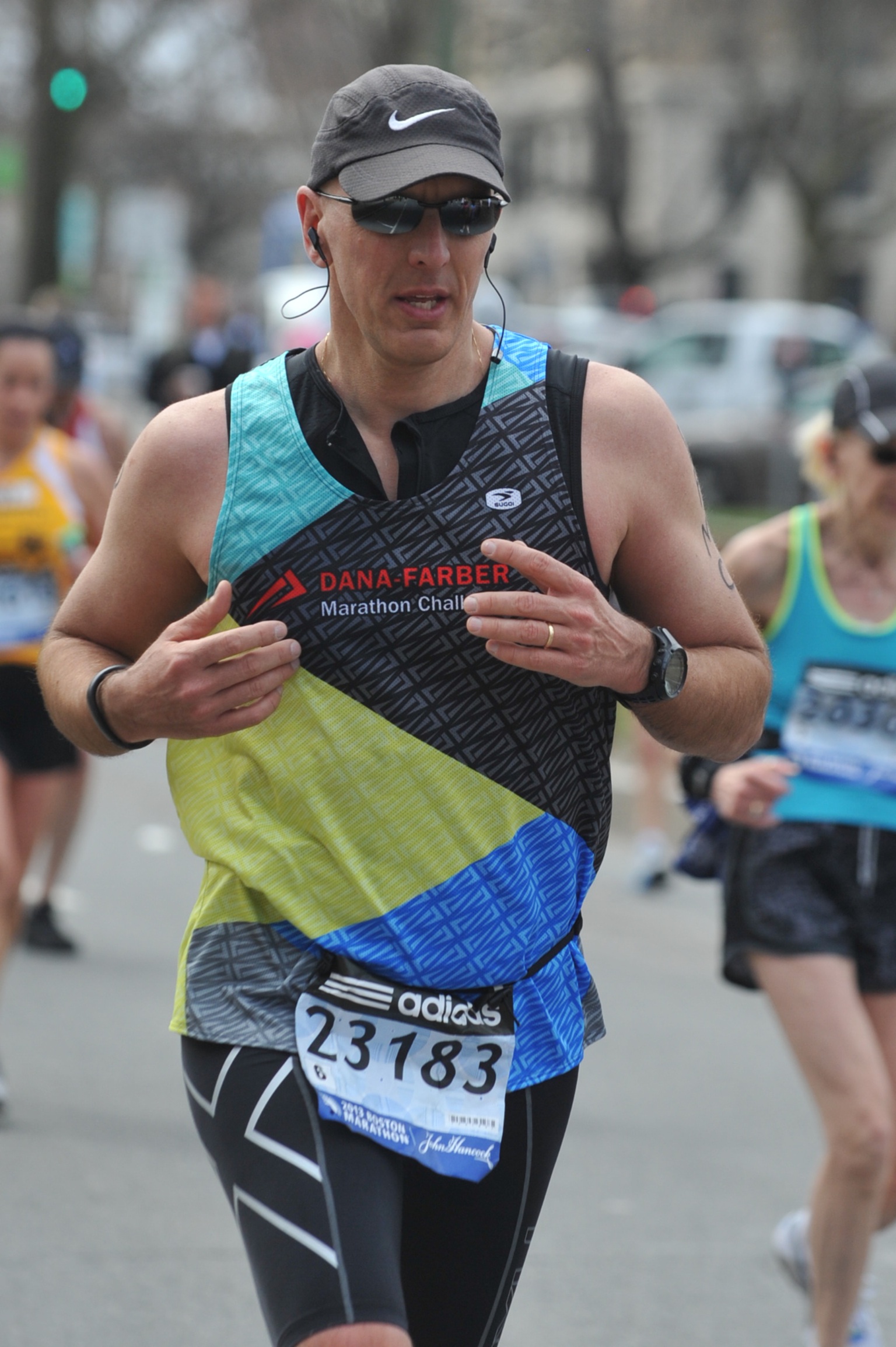
I never considered myself a runner, but five years ago my best friend Brad called to tell me he had cancer. Brad was always the fit one, and I decided running could be a way for me to support him and raise money for his cause, the Dana-Farber Marathon Challenge, which benefits the Dana-Farber Cancer Institute in Boston. Before I knew it, I had signed up for my first marathon: the 2013 Boston Marathon.
The evening before the race my family walked down Boylston Street to scope out where they should stand during the marathon. We decided the area by the finish line would be too packed, and so they chose an area further back. When we passed the medical tent, my 14-year-old daughter said to me, “Dad, I hope you don’t end up here.”
The marathon was tough, but when I reached the 20-mile mark, I remember thinking to myself, this is it. My body was tired, but I was genuinely having a great time. I thought about Brad as I pushed through the last few miles–he was undergoing chemo at the time. I came up to the street where my family was, and I was rejuvenated when I saw them yelling and waving. When I turned onto Boylston Street, I was hugging the left side of the road like my training plan had advised. I started waving to the people cheering on the sidelines. I even stopped to thank a soldier for his service. I could see the arches over the finish line only 10 yards away and I was overwhelmed with excitement.
Then, suddenly, everything changed.
There was a huge flash to my left, right where I was waving to fans only a moment before. I felt the bang, and immediately grabbed my head in pain. My foot was hit with shrapnel, and an older man in orange (you may recognize him from footage of the explosion) collapsed in front of me.
I saw and felt the second blast, but I could barely hear it. I looked down and realized my foot was in a pool of blood, and I limped to the very medical tent my daughter didn’t want me to go.
Lying in the hospital bed later that day, I felt my phone buzz. It was a text from the Boston Athletic Association: “Congratulations on your time, you finished the Boston Marathon!”
Recovery was not easy, but I started trying to jog a bit in late May. I still have hearing loss in my left ear and I can feel the injuries in my foot, but by that summer I was running without much pain. Running is how I support Brad, so I was determined to continue. Since its inception 25 years ago, the Dana-Farber Marathon Challenge has raised more than $61 million for cancer research. I’m one of more than 700 runners on the team this year raising money. I even ran the New York City Marathon in November.
I decided I also needed to start taking care of my emotional self to better understand my physical and hearing related issues, and I joined a support group for people injured in the bombing. I realized when I met them for the first time that these were the very same people I was waving to at the finish. We understand each other’s pain. We saw and felt the same things, we were within feet of each other when it all happened.
In the late fall it was announced that everyone injured in the bombings received two entries into this year’s marathon. Many of the people within my support group dealing with similar injuries were ecstatic. This was the marathon where we could take back our hearing, take back that chunk from our leg, take back our ability to walk. It wasn’t a tough decision to sign up for the second time. We’ve created a running group called 4.15 Strong, and 28 of us will be running the Boston Marathon. We’re a rag-tag group of runners. Some of us are limping, some walking, some running.
I’m constantly thinking about what it will be like to run that route again. I’ve made myself return to Boylston Street many times so that it won’t be as emotional on race day. It’s already set up just like it was last year. This year, I’ll be at the finish line to make sure all 28 of us make it across. We are taking back what was taken away from us last year as runners and spectators….and we’re running for those that can’t.
You hear a lot about “Boston Strong,” resilience, and recovery. I’ve seen what that means. I’ve witnessed people learn how to walk again with one leg, or learn how to walk with two new legs. People just don’t give up, we adapt and we persevere.
Dave Fortier lives outside of Boston in Newburyport, Massachusetts, where he owns a process and network optimization company. He lives with his wife and two daughters. You can visit his marathon fundraising page here.
More Must-Reads from TIME
- Donald Trump Is TIME's 2024 Person of the Year
- Why We Chose Trump as Person of the Year
- Is Intermittent Fasting Good or Bad for You?
- The 100 Must-Read Books of 2024
- The 20 Best Christmas TV Episodes
- Column: If Optimism Feels Ridiculous Now, Try Hope
- The Future of Climate Action Is Trade Policy
- Merle Bombardieri Is Helping People Make the Baby Decision
Contact us at letters@time.com